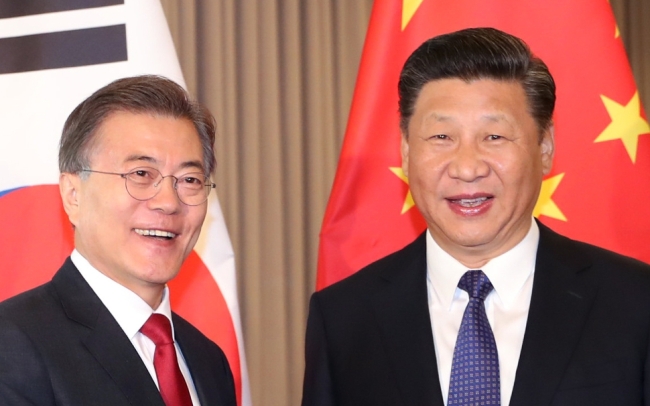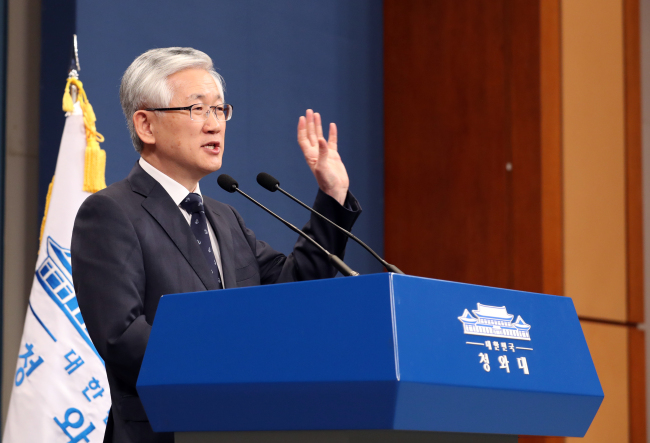Seoul, Beijing to work on improving ties, hold summit in Vietnam
By Choi He-sukPublished : Oct. 31, 2017 - 13:22
The South Korean and Chinese presidents will hold a bilateral summit on the sidelines of Asia-Pacific Economic Cooperation forum in Da Nang, Vietnam next week, Seoul announced Tuesday.
Nam Gwan-pyo, a deputy chief of the National Security Council, said that the two sides agreed to the summit meeting, which could be the first step in normalizing the two countries’ fraught relations.
South Korean President Moon Jae-in is scheduled to attend the forum on Nov. 10 and 11.
“This agreement is the first step of the agreement to quickly bring exchange and cooperation in all areas back on track,” Nam said, referring to the Seoul-Beijing agreement released by the Ministry of Foreign Affairs.
Nam Gwan-pyo, a deputy chief of the National Security Council, said that the two sides agreed to the summit meeting, which could be the first step in normalizing the two countries’ fraught relations.
South Korean President Moon Jae-in is scheduled to attend the forum on Nov. 10 and 11.
“This agreement is the first step of the agreement to quickly bring exchange and cooperation in all areas back on track,” Nam said, referring to the Seoul-Beijing agreement released by the Ministry of Foreign Affairs.

Nam added that the two countries are also discussing a possible meeting between Moon and Chinese Premier Li Keqiang on the sidelines of the ASEAN Plus Three meeting that will take place in Manila in November.
The Seoul-Beijing agreement, released ahead of Nam’s press briefing, states that the two countries would use all diplomatic means possible to resolve North Korean nuclear issue, and to normalize bilateral relations.
The agreement was reached in recent discussions between delegations led by Nam and Kong Xuanyou, China’s assistant foreign minister.
“The two sides reaffirmed the principle of peacefully resolving the North Korean nuclear issue, and to use all diplomatic means,” Seoul’s Ministry of Foreign Affairs said in a statement.
“The two sides agreed to improve strategic communications and cooperation to this end.”

On the matter of the deployment of the THAAD US missile defense system, the two sides appear to have failed to narrow their differences, but agreed to have their militaries communicate on the matter.
The Foreign Ministry statement said that Chinese negotiators reiterated the country’s opposition, and the worries over THAAD system’s possible infringement of China’s military information, but took note of Seoul’s explanations.
Seoul and Washington maintain that deployment of THAAD in South Korea is aimed solely at North Korean missile threats, and that its radar capabilities will not be used against another country.
China has opposed Seoul’s decision to deploy the THAAD missile defense system, and has taken retaliatory action against South Korean businesses. China, however, has recently shown signs of softening its stance, extending the $56 billion currency swap, while group tours to South Korea have resumed.
A high-level government official said on condition of anonymity that China may have taken into account a number of factors in its approach to relations with South Korea.
According to the official, factors such as North Korea’s provocations aggravating tension on the peninsula, resulting in closer cooperation among Seoul, Washington and Tokyo may have had an impact. While THAAD issue remains outstanding, the official said that the two sides share the view that the matter dealt with separately.
He added that the agreement the two countries’ foreign ministries reached was a clear statement of their will to improve relations.
By Choi He-suk (cheesuk@heraldcorp.com)







![[Graphic News] More Koreans say they plan long-distance trips this year](http://res.heraldm.com/phpwas/restmb_idxmake.php?idx=644&simg=/content/image/2024/04/17/20240417050828_0.gif&u=)
![[KH Explains] Hyundai's full hybrid edge to pay off amid slow transition to pure EVs](http://res.heraldm.com/phpwas/restmb_idxmake.php?idx=644&simg=/content/image/2024/04/18/20240418050645_0.jpg&u=20240419100350)






![[From the Scene] Monks, Buddhists hail return of remains of Buddhas](http://res.heraldm.com/phpwas/restmb_idxmake.php?idx=652&simg=/content/image/2024/04/19/20240419050617_0.jpg&u=20240419175937)

![[KH Explains] Hyundai's full hybrid edge to pay off amid slow transition to pure EVs](http://res.heraldm.com/phpwas/restmb_idxmake.php?idx=652&simg=/content/image/2024/04/18/20240418050645_0.jpg&u=20240419100350)

![[Today’s K-pop] Illit drops debut single remix](http://res.heraldm.com/phpwas/restmb_idxmake.php?idx=642&simg=/content/image/2024/04/19/20240419050612_0.jpg&u=)